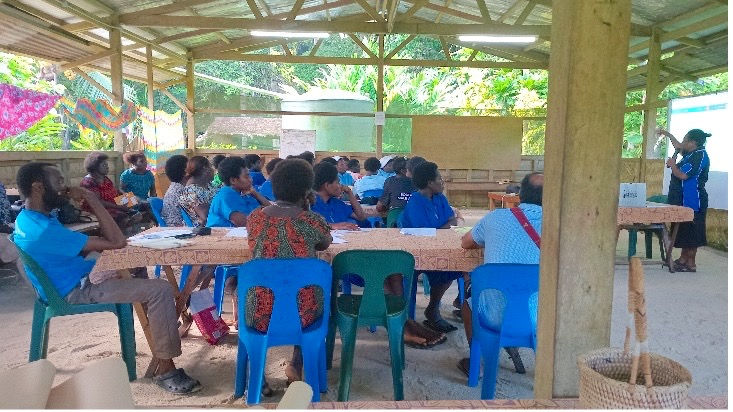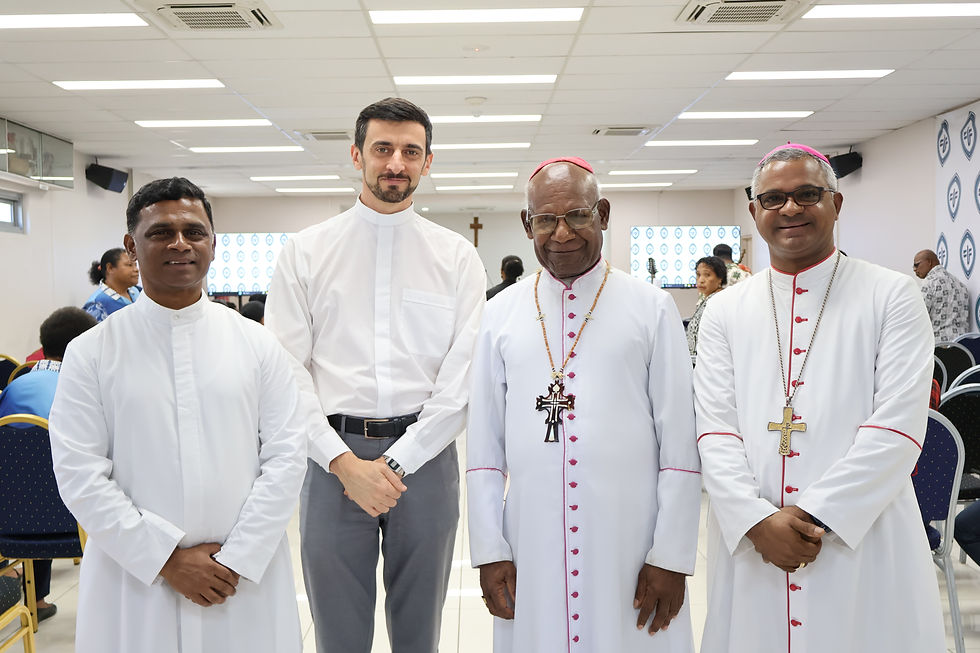The Nazareth Centre for Rehabilitation’s safe house staff and volunteers attend SARV training
- Sr Arnolda Kavanamur SSpS
- 5 days ago
- 3 min read
BOUGAINVILLE - On July 30th to August 1st, 2025, the Melanesian Institute hosted a Sorcery Accusation-Related Violence (SARV) training at the Nazareth Centre for Rehabilitation (NCFR) in Chabai, Selau District.

The SARV training had as its theme, “From fear to understanding: Equipping hearts and hands to respond to SARV with compassion, courage, and justice.”
The training was focused on equipping safe house staff and volunteers with the knowledge, skills, and confidence to provide trauma-informed, inclusive care to SARV survivors. Additionally, to advocate effectively for prevention and justice.
There was a total of 35 participants, including staff from NCFR’s safe house, House Bilong Stretim Tingting na Pasin (HSTP), SARV survivors, Congregation of the Sisters of Nazareth (CSN) and novices, and CSC priests and brothers. Among the participants were 6 individuals who identified as persons with special needs. The training was facilitated by Sr. Arnolda from the Melanesian Institute.

Through the collaboration with Catholic safe houses throughout Papua New Guinea, the Melanesian Institution has strengthened the capacity of staff and volunteers to respond effectively to SARV cases. The training created an inspiring atmosphere that gave SARV survivors who attended the training the strength and courage to share their personal experience of being a victim of SARV.
The safe house staff felt encouraged and empowered by the information given to them, and it has inspired them to continue to be the frontliners in advocating for justice for SARV cases. Sr. Arnolda, facilitator, stressed to participants, “Be critical in your thinking, do not just look on the surface of the issues”.
One of the key figures in advocating against violence, Sr. Lorraine CSN, stated that, “Churches need to step up and begin dealing with these SARV cases and issues by educating the people on the pastoral approach on sorcery to prevent more people from being falsely accused.”
The participants discovered aspects behind the SARV cases and issues such as land disputes, leadership issues, wealth, and jealousy. The training focused on understanding the root causes and beliefs of SARV cases and issues, detailing the methodology on how to find the root cause and analyze the beliefs of SARV within their communities.
Cecelia, a healthcare officer, and a guest speaker, shared insights from the medical perspective: “When a person dies, we always assume it is sorcery without considering how that person lived his/her life, that person could have had lung cancer from smoking or could have had stomach ulcer from drinking alcohol at a very young age.” Stressing also that people must request medical reports from the hospital whenever a relative of theirs dies, so that whenever rumors of sorcery arise, they have a medical report that clearly explains why that person died or why that person was sick.

The training also explored the psychological and social impact on survivors, which emphasized the trauma/mental health of survivors of SARV. Also discussed was the Law and Right-based response, which included the three main ways of approaching SARV cases or issues. The Law approach, which made clear the Glassman/Meri Act, the cultural approach, and the pastoral approach that focuses on the mercy and forgiveness approach. Sr. Arnolda also emphasized that mercy, forgiveness, and justice go hand in hand when responding to SARV cases. We cannot have mercy and forgiveness without justice.”
Finally, the strategies for education and prevention: safe house practice and way forward were discussed, which led to participants creating a referral pathway for NCFR with the help of the SARV survivors present at the training.
Collaborative efforts displayed by the Catholic Safe houses in bringing the Melanesian Institute (MI) to facilitate the SARV training to NCFR safe house staff and volunteers have strengthened bonds, which demonstrate true partnership.
The training has effectively equipped and empowered NCFR’s safe house staff and HSTP staff with the knowledge, skills, and confidence to continue to be the front-liners defending the victims of SARV cases in Bougainville. With the establishment of safe houses in South, Central, and North Regions, survivors have greater access in terms of their protection, support, and counseling, which will help them overcome trauma and mental health.






Kommentare